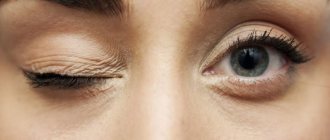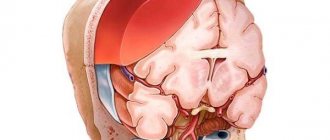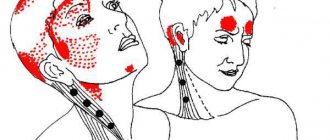Can there be an allergy due to nerves?
The article discusses the peculiarities of the occurrence of allergies against the background of nervous shock, its causes, symptoms and treatment.
Allergy is a process that occurs in the body as a result of a reaction to external stimuli. However, there are cases when patients complain of allergies without specific reasons and severe symptoms, in which case the doctor makes a diagnosis of a nervous allergy.
Nervous allergies occur against a background of constant stress, hysteria, nervous breakdown, as well as any psycho-emotional stress. This phenomenon is observed in rare cases and mainly in women, this is due to factors such as:
- Hormonal imbalance in a woman during menopause;
- Characteristic hormonal surges during pregnancy in a woman;
- Due to the peculiarities of a woman’s psychological structure.
It is worth noting that this phenomenon is also observed in men, but it occurs much less frequently compared to the female sex.
Causes of nervous dermatitis
The exact cause of this disease is unknown. It is believed that this is a special condition of the nervous system in which the nerve endings are on high alert and tell the brain that the skin is itching, although in fact there is no irritant causing itching.
Provoking factors
It is unclear what exactly initiates the inflammation process, but it has been noted that certain exposures can cause an exacerbation of neurodermatitis. Here is a list of triggers that, according to reviews, most often provoke the disease.
- Stress and negative emotions;
- Nerve damage;
- Insect bites;
- Harsh soaps and detergents;
- Some types of fabrics that are tough, scratchy or scratchy, such as wool;
- Perfumes, skin care products, cosmetics;
- Pollen and mold;
- Wool, dander, dried saliva of pets;
- Tobacco smoke;
- Dry and frosty winter air, low air humidity;
- Hot shower or bath, too long washing;
- Dry skin;
- Sweating;
- Dust or sand;
- Certain foods (most commonly eggs, dairy, wheat, soy, and nuts).
Risk factors
- Female. Women are more prone to nervous dermatitis than men.
- Young age. Neurodermatitis usually affects people under fifty years of age.
- Other skin diseases. Patients suffering from atopic dermatitis, eczema or psoriasis are more likely to develop nervous dermatitis.
- Anxiety disorder, obsessive-compulsive disorder, as well as other conditions accompanied by nervous tension are a powerful provoking factor for itching in neurodermatitis.
Symptoms of nervous dermatitis
- Itching. With neurodermatitis, an itchy area appears on the skin. Unlike psoriasis or eczema, this disease has only one or two affected areas. Very rarely, neurodermatitis spreads and multiple lesions develop. The patient often scratches or rubs the affected area. No objective reason for the itching is identified. Itching intensifies during rest and at night, and stress provokes exacerbations.
- Pain. Some patients report pain. When the disease affects the scalp, it is accompanied by pain or a combination of pain and itching.
- An area of skin with raised edges is rough and dense to the touch, red or purple in color, which appears if the patient continues to scratch.
- With repeated scratching and chronic progression, the area of the pathological process thickens, the surface looks leathery, brownish, and with pronounced thickening it has a grayish tint.
- Hair loss is possible, especially noticeable if the affected area is on the scalp.
- When scratching, the epithelium is damaged, and open wounds and ulcers are formed that bleed. This may lead to infection.
- With a long course and frequent damage, scars form.
- If the integrity of the epidermis is compromised, a bacterial infection occurs. Swelling and pain occur, redness intensifies, and discharge appears, which dries out in the form of yellow crusts.
Nervous dermatitis in children
Nervous dermatitis in most cases starts in childhood, its symptoms are similar to the disease in adults, and it differs in its characteristic location on the face, neck and elbow bends (see photo). Prolonged contact with allergens and the lack of treatment for atopic dermatitis lead to the baby constantly scratching areas of the skin. This pushes the allergic reaction into the background, making itching the main symptom. The difficulty is that it is impossible to explain to young children that they should not scratch the affected areas. If atopy goes away on its own with age in many people, then a disease that has reached the stage of neurodermatitis is much more difficult to interrupt, especially considering that many glucocorticoid drugs are prohibited for use in children. It is important to consult a doctor in time for treatment.
Allergies after stress
What causes allergies?
I talked about the four main causes of allergies in children and adults in this article >>
But few people know that sometimes severe allergies begin after stress , nervous shock or prolonged experiences.
And this is not surprising - stimulation of the nervous system leads to stimulation of other body systems, and in particular to stimulation of the immune system.
Of course, you need to understand that there are a huge number of types of allergies. And therefore, a doctor who claims that allergies happen only “because of nerves” risks being subjected to fair criticism and ridicule. A doctor who claims that he can cure allergies with psychotherapy alone may be subject to even greater skepticism. Most likely, he will be perceived as an adventurer and a charlatan.
But the fact that in many cases an allergic reaction begins precisely when the patient is in a difficult emotional state is a fact well known to allergists.
For example, children often suffer from allergies, whom their parents constantly scold and poke at for no reason or reason. Children whose parents constantly quarrel and argue with each other often suffer from allergies. The echoes of these quarrels, even if adults try to hide them, are sure to reach the child and each time painfully wound his soul.
Long-term worries about parental quarrels and the little man’s impossible desire to reconcile his parents lead to a serious internal conflict, which, in turn, can become an impetus for the development of allergic diseases.
Less often, the opposite extreme leads to the development of psychopathology and subsequent allergies, when the child becomes the center of the Universe in the house, when everything is subordinate to his desires, they rush around with him all day long, constantly look after him, try to please.
Whatever the initial inclinations of the baby, with such upbringing he loses his sense of reality and self-control. For such a child, allergies can be a good way to attract attention to himself in cases where the attention of others for some reason has become insufficient for him. Very often in such children, allergies manifest themselves in difficulty breathing , in which the allergic person cannot do without the help of other people.
Finally, allergies can be caused by great emotional stress and severe emotional shock experienced in childhood. For example, the divorce of parents, the loss of someone close, separation from the family, moving to a new place of residence, and even the birth of a younger brother or sister (which automatically deprives the older child of a number of “privileges” and parental care and attention).
Overexertion at school in pursuit of good grades, problems communicating with peers (especially when a child in his class falls into the category of outcasts or losers) also undermine the immune system and increase the child’s chances of becoming allergic.
Fortunately, all these problems are usually resolved in one way or another or processed by our consciousness during the period of growing up, by the age of 18-20. It is at this age that many people's allergies go away.
But for about a third of people, allergies do not go away as they grow up, and for some, on the contrary, for the first time it suddenly begins in adulthood.
This can be due to accumulated difficult experiences or severe emotional fatigue - fatigue from work, from life, from a spouse, from one’s unlucky children, etc.
Often, an allergy that occurs in adulthood indicates dull irritation and the fact that a person experiences strong hostility, even rejection, towards one of the people around him. It’s not for nothing that when we don’t want to communicate with someone, we often say: “I’m allergic to him.” That is, sometimes an allergy is a rejection that has reached the physical level.
Psychologists have also noticed that many allergy sufferers are touchy and tend to consider themselves the object of aggression; sometimes they experience the feeling that “the whole world has turned against them.”
But if a person with allergies manages to rebuild his internal state, if he gets out of the state of internal conflict with the people around him, if he calms down internally and ceases to feel like a “victim of a worldwide conspiracy,” he thereby knocks the rug out from under the feet of allergies.
This does not mean that the tendency to allergies will immediately disappear - after all, the immune system is already in an aggressive state, and it will take time for the immune organs to “get used” to the new state and rebuild. However, in any case, the manifestations of allergies will soon decrease, and if you are lucky, they will gradually go away altogether.
A case from the practice of Dr. Evdokimenko:
One of my patients, Antonina Ivanovna, through no fault of her own, found herself in a difficult conflict situation at work and was subjected to unfair attacks from employees and her immediate superior. She became a kind of “scapegoat” and an outcast in the team. Antonina Ivanovna was “harassed” and picked on without any reason, day after day, for several months.
And since Antonina Ivanovna was a very responsible person, she always tried to gain the approval of her superiors, she took unfair reproaches very painfully. It began to seem to the woman that everyone was up in arms against her, “the whole world was up in arms.” Antonina Ivanovna was very upset, offended and irritated.
All this went on for quite a long time, and it is not surprising that after some time the woman developed an allergy (which she had never had before). First, I developed an allergy to washing powder, then to some of my favorite foods. Then a severe, deadly allergy to bee stings appeared. Moreover, what seemed most surprising to the woman was that the bees seemed to deliberately begin to bite her at every opportunity.
In fact, there was nothing surprising or mystical in the behavior of bees. It’s just that these little creatures react very strongly to the smell of stress hormones. After all, if this smell comes from a person, it means that he is in an excited, possibly aggressive state and can pose a threat. This means that you need to defend yourself from it, and you need to attack it (for bees, defense is an attack).
When Antonina Ivanovna turned to me for advice, we began to think about how she could get out of a conflict situation at work more gently. On my advice, Antonina Ivanovna first took sick leave, then vacation.
On vacation, she had a good rest, thought about everything and decided... decided to change jobs. Having made this decision, Antonina Ivanovna calmed down, stopped “winding up” herself, “digested” her emotions and, with the help of simple psychological techniques, achieved mental balance.
Very soon her allergic reactions began to weaken, and then completely disappeared. And she’s allergic to bees... Antonina Ivanovna doesn’t know this, because the bees simply stopped attacking her - the woman no longer emanates the smells of prey and the smells of aggression.
My own case:
At the age of 18, when I was finishing my studies at medical school, we were sent to a summer internship at a hospital. I had to work as a nurse for 2 months in a department for seriously ill, bedridden patients. The work ahead was very difficult, even unpleasant in places.
Therefore, when the hospital management offered me to work for these 2 months in their accounting department in return, I was faint-hearted and agreed. But with my mind and heart I understood that working in accounting was not for me - it would not give me anything as a future doctor. And my body rebelled.
In the accounting department at that time they were painting the walls, and I began to have a terrible allergy to the smell of paint (I had never had an allergy before). The smell of paint made my eyes water so much that I physically couldn’t pore over the accounting papers.
After suffering like this for 2 weeks, I was forced to leave accounting and return to the medical department. The allergy disappeared instantly.
The most amazing thing is that when a year later I joined the army, I was constantly in contact with different paints. And he even personally painted several hundred square meters of walls, floors and ceilings with a variety of different types of paints and varnishes. But never, never again have I had an allergy to paint or its smell.
Chapter from the book “The Cause of Your Illness” by Dr. Evdokimenko, 2003. Edited 2012
Types of nerve rash
Nervous allergy is a hypersensitive reaction in the absence of the allergen itself. The inflammatory reaction develops due to irritation of nerve endings - sensitive receptors. At the same time, the same substances as in allergies are released into the surrounding tissues and cause similar changes: itching, swelling, rash and redness. This process is involved in the formation of symptoms of skin diseases (eczema and psoriasis), as well as asthma, migraines, and vasomotor rhinitis.
Urticaria is a disease in which there is redness of the skin, itching and a characteristic rash in the form of irregularly shaped tubercles that can merge with each other. Such changes are provoked by contact with an allergen, exposure to cold, sun, pressure on the skin, as well as emotional stress. Nervous urticaria is quite rare and usually goes away once the stressor is removed. Treatment uses sedatives, as well as drugs that affect the functioning of the autonomic nervous system.
Nervous scabies, or neurogenic itch, is a condition that forms in the brain, while the skin is not affected by the disease. Itching can originate from the brain, or from peripheral nerves and receptors. Central neurogenic includes, for example, a feeling of itching in the amputated limb. The nerves may be pinched by a tight muscle or misaligned bone, causing itching. With shingles, there may also be itching in the area of the affected nerve. In the treatment of nervous scabies, glucocorticoids and antihistamines are ineffective. In case of nerve damage, local anesthetics and capsaicin (a red pepper alkaloid that affects pain receptors) help. If the cause is in the brain, medications are prescribed that act on the pain processing centers in the central nervous system. These are pregabalin and gabapentin.
Too much stress makes us vulnerable to infections
When we experience long-term severe stress or very often encounter stressful situations, the functioning of the immune system is undoubtedly disrupted. In this case, the ability to fight harmful bacteria is most often preserved, but the protection against viruses is weakened. Apparently, in the event of a direct threat to life - say, if you are about to be hit by a bus - it is more important that the body can primarily fight bacteria if they enter the body at the site of a possible injury, rather than resist the viral pathogens of a cold or flu.
Hans Selye was the first to notice this pattern more than 80 years ago: he wrote how cortisol dramatically affects the functioning of the immune system. During the experiment, experimental rats were subjected to severe stress, and at the same time they experienced significant and profound suppression of the immune system: the thymus gland was destroyed (and it is in it that T cells are produced), as a result of which the animals more often developed tumors, stomach ulcers, and developed diseases, directly related to stress. Later experiments involving people assessed the body's response to viruses, and it turned out that students' antiviral response weakened during the session and due to exam-related stress, and the subjects began to get colds or flu more often. It turns out that by throwing all our energy into cramming before an exam, we experience serious stress and risk getting sick; in response to this, the sympathetic nervous system is activated, but the immune system is disrupted.
View on Instagram
The problem, however, is not limited to colds: when under stress, we more often become victims of the family of herpes viruses, which includes ordinary herpes (it is because of this that rashes appear on the lips and inflammation in the genital area), and the varicellazoster virus (which causes chickenpox), and cytomegalovirus, and Epstein-Barr virus, and others. Most of us have encountered or will certainly encounter at least one of these. For example, the Epstein-Barr virus is believed to affect about 95 percent of the population. It is part of our microbiome and can live inside a person for decades without causing any problems. This state is called latent. However, all these viruses are real opportunists; they skillfully choose the right moment and launch the so-called lytic cycle, causing open inflammation. The virus is not activated by chance, but precisely when the immune system is distracted (for example, by stress): an increased level of cortisol serves as a signal for the virus to enter the active stage. Such microorganisms are able to recognize when we are experiencing particularly severe stress, and take advantage of the moment, but they themselves turn out to be a source of stress and stimulate the hypothalamic-pituitary-adrenal system in order to achieve a further increase in cortisol levels, be able to develop inside the body and not be afraid of resistance from the immune system. No antiviral drugs will solve the problem in the long term if you do not deal with stress.
View on Instagram
Treatment of nervous dermatitis
Nervous dermatitis does not go away on its own; without medical help, external skin changes (see photo) and symptoms intensify, so it is very important to start treating this condition in adults and especially children on time. In addition to drug therapy, it is important to follow good skin care rules and adhere to a certain lifestyle; without this, medications will not be of sufficient benefit.
- You need to stop scratching and rubbing your skin. The itching can be intense, but to control symptoms and prevent flare-ups, it is important to refrain from scratching.
- A cool, damp compress will soothe the skin and reduce itching. In addition, using such a compress before applying a medicinal cream helps the medicine penetrate deeper into the dermis.
- To protect the affected areas from scratching, you can cover them with a bandage. This is especially useful if the patient tends to itch at night, during sleep, and therefore cannot control it.
- Nail care is also very important. In order to cause as little damage as possible when unknowingly scratching or at night, nails should be trimmed short and polished with a nail file.
- Take a warm bath to hydrate your skin. The water should be close to body temperature, in no case hot, and the procedure should last no longer than ten minutes. You can add oat decoction to the bath. It is better not to use soap and shower gel, especially those with dyes and fragrances. Afterwards, gently pat your skin with a towel and immediately apply a hypoallergenic moisturizer.
- Avoid triggers. Pay attention to what usually triggers a flare-up and try to avoid it. For example, use special techniques to cope with stress, do not wear irritating clothes.
Treatment with medications
Only a doctor can diagnose nervous dermatitis and select drug treatment. Therapy has several directions.
| Fight itching |
|
| Softening thickened skin | Salicylic ointment has a keratolytic effect and reduces the thickness of the affected area. |
| Treatment of infection | Antibiotics topically in the form of ointments, or orally in the form of tablets, help fight infection |
| Wound healing | Scratching leads to the appearance of wounds, which are treated in the following ways:
|
| Stress therapy | Stress and anxiety are the main triggers of neurodermatitis, so for treatment to be effective, nervous tension must be eliminated.
|
The main ways to combat allergies due to nerves
Only an integrated approach can cope with allergies that are psychogenic in nature. In this case, drug treatment or ASIT therapy are practically useless, and they are replaced by reliable and well-proven alternative methods:
- acupuncture;
- acupressure;
- reflexive-manual therapy, etc.
Combining such effects allows you to activate the body's systems and get lasting results. Therapy is not aimed at reducing sensitivity to a specific allergen, which is basically not possible in this case. There is a basic establishment of the functioning of neurohumoral regulation, as a result of which the body gets rid of the disease.









